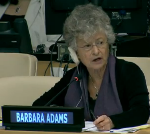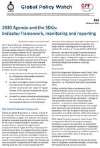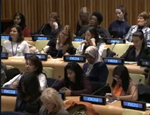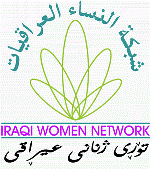Social Watch news
Published on Thu, 2016-03-31 14:26
During the session on “accountability and transparency of multi-stakeholder partnerships” held in the framework of the Partnership Forum at the UN, Barbara Adams from Global Policy Forum and Social Watch said that partnerships are based in a win-win dynamic but there is a need to understand of what is "win-win".
Would be beneficiaries of such initiatives have to be included, she argued. "We need to look and see how the contribution of partnerships has benefits. We need a more systemic approach when we are looking at the win-win approach".
|
Published on Fri, 2016-03-25 11:14
The United Nations Special Rapporteur on the situation of human rights in the Palestinian territories occupied by Israel since 1967, Mr. Makarim Wibisono of Indonesia, has stressed the critical need for the international community to increase its protection of the Palestinian population.
Mr. Wibisono, who has resigned because of Israeli non-cooperation with his task, while presenting his final report to the Human Rights Council, recalled the well-documented violations related to the Israeli occupation policies and practices in the Occupied Palestinian Territory (OPT), and appealed to the Government of Israel, as the occupying power, to take practical steps to implement protections under international law as it pertains to the Palestinian population living under occupation.
|
Published on Thu, 2016-03-24 10:44
Freedom of association is an enabling right that underpins inclusive development. The social movements that have flooded the streets of the Arab Spring have the potential to democratize the state and secure democratic transition. However, what Europe calls "Southern Neighbouring" countries are recording alarming shrinking space for civil society, violations of freedom of association and peaceful assembly, coupled with restrictions of the right to access to information and challenges in mobilizing financial resources.
|
Published on Wed, 2016-03-23 00:00
Fiscal policy—that is the raising and spending of public resources—is one of the most important structural policies which determines the degree to which a State can ensure human rights for all, without discrimination. As evidenced in the first-ever thematic audience on fiscal policy and human rights held by the Inter-American Commission on Human Rights (IACHR) this past October, who pays for what public services, and who truly benefits, are fundamental questions at the heart of any efforts to protect democracy and realize human rights.
Why is tax and fiscal policy essential to realizing economic, social, cultural and environmental human rights (ESCER) in the United States?
|
Published on Fri, 2016-03-18 12:50
On 11 March 2016 the UN Statistical Commission agreed “as a practical starting point” with the proposed global indicator framework by which to measure progress towards the 17 goals and 169 targets of the 2030 Agenda for Sustainable Development. It recognized that the development of a robust and high quality indicator framework is a process that will need to continue over time and authorized the Interagency and Expert Group for Sustainable Development Goals (IAEG-SDGs) to continue its work
|
Published on Thu, 2016-03-17 19:36
The days leading to the adjournment of the Philippine National Congress every three years have always been an uneventful political time.
At about this time, Congress is a picture of empty chairs and half-lit hallways as most legislators would have already been prematurely campaigning for their re-election or that of a family members’ new election bid rather than burdening themselves with attending sessions.
|
Published on Fri, 2016-03-11 12:07
During the United Nations observance of International Women's Day 2016, Barbara Adams from Global Policy Forum and Social Watch addresses the obstacles to Women's Rights: the unfair global trade and investment system and the lack of a debt workout mechanism deviate the resources that should ensure an universal social protection floor.
|
Published on Thu, 2016-03-10 09:00
Financiers can have significant influence over the operations of multinational companies and their role needs to be the subject of greater interrogation, in theory, policy and practice. Financial institutions are the less visible players in the work of corporations. This is probably why, in the international business and human rights debate, there is little focus on the role of financial institutions. But the lack of focus remains strange given the indispensable and powerful role played by those who finance the operations of corporations. Part of the reason for this, as Dowell-Jones and Kinley point out, is that human rights lawyers and actors are not au fait with financial doctrine and language. In order to address the role – both positive and negative – of financial institutions, we need to remedy the inability to understand financial language. This was part of the motivation behind the Wits University Round Tables in 2011 which brought together bankers, activists and academics.
|
Published on Mon, 2016-03-07 14:13
As global women movement celebrates International Women's Day on March 8th, while everyone is silent listening to the anthem of freedom and peace, and what has been achieved in progress toward full substantive equality in rights, Iraqi women celebrate this day while they are either internally displaced, refugees, abducted, or as slaves and victims of sexual and physical and community violence, with extreme deterioration of their rights under a scene of growing projects and plans devoted to persecution and the violation of their dignity and degrade of their humanity, with alarming practices of exclusion and marginalization of women in decision-making places, which can be Inferred from the content of the Political Parties Law (No. 36) for 2015, which lacked the inclusion of Women Quota representation at the founding of the party and leadership structures.
March 8th comes this year, with mounting concern, towards serious challenges that faces the country, given the weakness of the State and its institutions, and the escalation of the armed conflict among multiple groups, with the resurgence of violent extremism and terrorism through Daesh (ISIS) control of vast areas of Iraq, corruption and religious and political sectarianism at the State institutions and society levels, and absence of trust between the parties in the political process with the lack of national vision and concept of community reconciliation and social cohesion, as the protest movement widens among our people.
|
Published on Mon, 2016-03-07 14:05
The study Making Women Count. The Unequal Economics of Women’s Work, looks at how women in Canada and around the world are affected by rising inequality, including the burden of unpaid work, the undervaluing of work in predominantly female fields, and the unspoken social norms that see men offered higher wages and rates of promotion than women. Women make up some of the poorest and lowest paid workers in the global economy. And, as the report shows, women are doing more and more work to grow countries’ economies without seeing equal benefits.
The study offers a number of solutions to help make women count, including a shift towards policies that support better wages and access to employment for women, better financial support of public services - like health and child care – to reduce the care burden on women, and a greater focus by governments to prioritize women’s rights.
|
SUSCRIBE TO OUR NEWSLETTER
Submit

|










